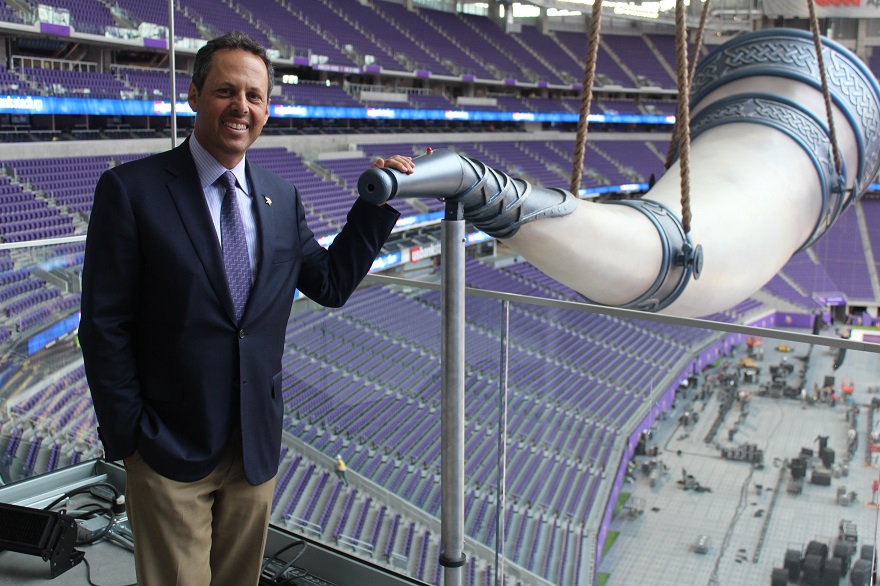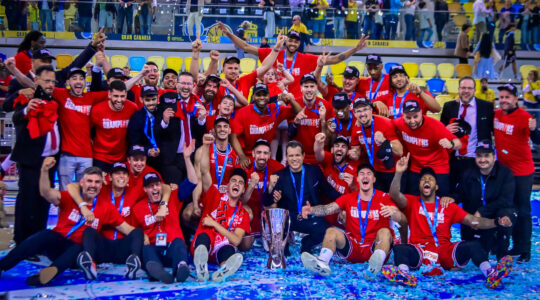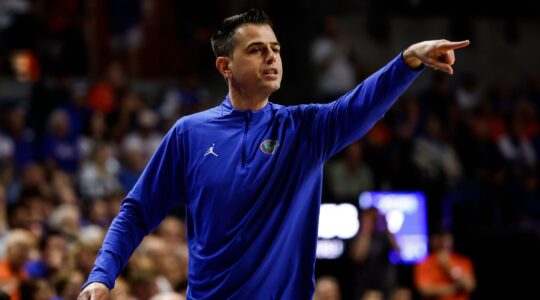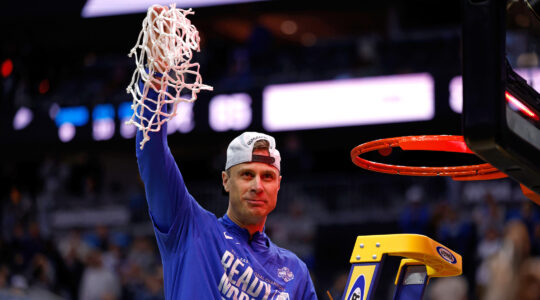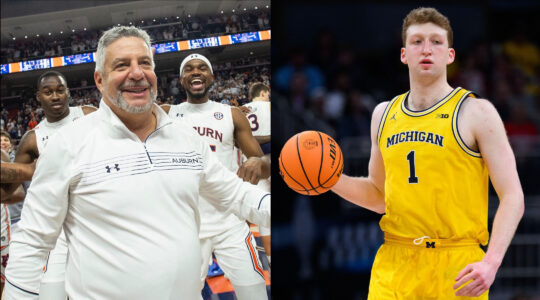MINNEAPOLIS (JTA) – Minnesota Vikings head coach Mike Zimmer stepped up to an 800-pound gjallarhorn and exhaled with all he had to launch the festivities that officially inaugurated the team’s $1.1 billion stadium.
Music lovers would have found the deep, uneven sound revolting, but the Nordic instrument is plenty melodic in inspiring Vikings’ partisans.
The team’s owner, Mark Wilf, 54, offered a Jewish take on the gigantic horn.
“When we first bought the team, a rabbi in St. Paul said, ‘You realize that the horns on the helmet are shofars.’ I kind of chuckle about that sometimes,” Wilf, sitting 50 feet from the newly installed horn, said in an interview with JTA 24 hours before the stadium’s dedication recently.
“It’s something the fans bond around: The Vikings are coming! There’s something – I don’t want to say sacred, but really special — about a football game-day experience.”
Wilf would know. He and his brother Zygi, 66, along with several other relatives, bought the National Football League franchise in 2005 and attend all the games, home and away. The brothers fly in from New Jersey, where they run the family’s real estate business.
And as kids, they attended New York Giants’ games with their father, Joseph, a Holocaust survivor from Poland — as is their mother, Elizabeth, who is in her late 80s. Less than two weeks after the stadium’s dedication, Joseph Wilf, a founder of one of the country’s largest real estate development companies and a major philanthropist, died at 91.
The opening of U.S. Bank Stadium on the site of the Vikings’ former home, the Metrodome, heralds a new era that Wilf hopes will include an NFL championship — a title that has eluded the organization since its founding in 1961.
Led by running back Adrian Peterson and quarterback Teddy Bridgewater, Minnesota won the NFC North division last season and reached the playoffs. The Vikings open the 2016 campaign with a road game before making their regular season debut in the new digs on Sept. 18 against the Green Bay Packers, a division foe.
The ribbon-cutting ceremony in July capped the owners’ prolonged effort to build a new stadium, a process that included contentious negotiations with the state’s governors and legislature. The owners eventually agreed to pay approximately half the construction costs.
“It’s been a long road to get here,” Wilf acknowledged, rattling off some key partners in the project. “There were a host of challenges to get through this, starting with the legislative process. It’s very gratifying to see the final product, and I can’t wait to see the excitement of our fans.”
The massive building is an architectural amalgam. Some of the exterior is darkly foreboding and some airily welcoming, with sections angling out sharply toward the streets and conjuring ships. Indoors, one side of the field and stands is bathed in sunlight thanks to a transparent roof, while the other is shaded. Behind one end zone, five enormous doors up to 90 feet high can hydraulically pivot to bring the outside in. The 66,000 seats are all purple.
Besides the stadium, the Vikings are building a new practice facility in suburban Eagan.
Many analysts had pegged Minnesota for another divisional crown until Bridgewater went down with a knee injury that will sideline him for the season.
Wilf is a hands-on owner, said the team’s general manager, Rick Spielman, noting they speak almost daily. The Wilfs have “never not given us the resources” needed to compete, Spielman said, and “give you the flexibility to do your job.”
“If you’re recommending a view and make a decision based on what you think is best, they support it 100 percent,” he said. “They trust in the people in the specific roles we all have in this organization.”
Wilf recalled the Giants games he attended long ago, when his father’s construction clients included former players.
The outings, he said, “got us exposed to football early on,” and also to maintaining perspective considering their parents’ difficult past.
“My dad, considering what he went through, always had an optimistic bent on things, so whenever we’d be heartbroken as kids about the Giants losing a game, he’d say, ‘Things could be worse – you could be the owners.’”
The football outings, which included a trip to Southern California to watch the Giants’ Super Bowl XXI victory in 1987, were “our family bonding experience,” he said. “Those types of things were special. Now our kids come to the games. It’s a family experience.”
Much of Wilf’s philanthropic energy goes toward assisting Holocaust survivors.
William Daroff, director of the Jewish Federations of North America’s Washington office, credited Wilf with helping to raise $30 million since early 2015 to benefit the organization’s National Holocaust Survivors Initiative, which assists some of the approximately 25 percent of the 120,000 survivors in the United States who live in poverty.
JFNA’s president, Jerry Silverman, said Wilf followed up personally to assure that a fellow philanthropist’s Holocaust-survivor relative received improved medical care.
“These people should live out their lives with dignity,” said Wilf, who recalled the many survivors among his parents’ circle of friends in Hillside, New Jersey.
In Minneapolis, the clan established the Wilf Family Center at the University of Minnesota Masonic Children’s Hospital. The institution is meaningful, too, to Vikings center John Sullivan, who said his brother Bob once received key medical treatment at another pediatric hospital.
“We have a very common, shared interest,” said Sullivan, who with his wife, Ariel, contributes to the Minnesota institution. “I have a whole lot of respect for [the Wilfs’] philanthropic endeavors.”
The next day, Elizabeth Wilf looked on from a lunch-laden table set atop the field as Minnesota Gov. Mark Dayton and other dignitaries spoke. Her sons sandwiched the governor, each grasping a golden scissor to cut a purple ribbon running the stage’s length of about 30 yards. With the ribbon sliced, confetti floated like a sweetly thrown touch pass.
The event was “a great personal milestone for our family, in addition to a great milestone for the community,” Wilf said. “We’re very proud that we have a new home here for the Vikings and that the Vikings have a stability and a future for generations to come.”
(The Minnesota Vikings sponsored the visit to Minneapolis of several journalists, including Hillel Kuttler. Mark Wilf is a member of the Executive Committee of the Board of Directors of 70 Faces Media, JTA’s parent organization.)
JTA has documented Jewish history in real-time for over a century. Keep our journalism strong by joining us in supporting independent, award-winning reporting.
